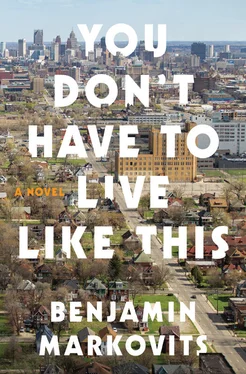“I know what it’s like,” Gloria said, “when you feel responsible. I had it my whole life. I don’t know if Marny told you, but my father died when I was seven, so it’s always been just me and Mom.”
“He did tell me. He said you live in the same apartment building. He said it mostly works out.”
“That’s pretty much accurate,” she said.
It’s a twenty-minute drive to Johanna Street and I fell asleep. You go about five miles on I-94, and in the dark and the highway noise I just closed my eyes. Gloria dropped us off, then switched to her own car and drove home. She had to teach in the morning and didn’t want to get in the way of our catching up. But it seemed to me something else was going on, too — that she didn’t want to sleep in the house while my brother was there, for some reason.
“Come on,” I said, “it’s his last night.”
“That’s why.”
“What are you teaching tomorrow anyway. The school year’s basically over.”
“There’s a lot of stuff I still got to take care of. Just hang out with your brother. I’ll come over tomorrow night.”
This put me in a bad mood. I was annoyed with her and didn’t want to talk to Brad about it. I didn’t want to explain or justify my annoyance but I couldn’t think of anything else to talk about. So we went to bed early. That short nap in the car made it hard for me to fall asleep. I just lay in the dark shifting around.
Brad couldn’t sleep either. I heard him turn on the television, and then I heard him on the telephone, talking to Andrea — Houston’s an hour earlier. Eventually he got off the phone and turned off the TV.
It seemed strange to me that my brother was lying about fifteen steps away. Until I was eleven years old we shared a bedroom and I used to fall asleep watching him read. Sometimes he woke me up in the night by going to the bathroom; afterwards, he made more noise, looking through his closet for new pajamas. Later I realized he was probably having wet dreams. Even then, when we were kids, we had these private lives, which we didn’t talk about. Sometimes I got scared in the night and wanted to climb into bed with him, but he always kicked me out. Then my parents built the extension and I moved into it, and a few years later he left for college. But we were never as close after I moved out.
In the morning, I walked to Joe’s to get a newspaper — there was one of those sidewalk dispensers outside his café, which carried the Free Press . I bought a few pastries, too. We sat around my kitchen table drinking coffee and reading. There was a front-page story about the Wayne County prosecutor. He hadn’t decided yet whether to bring criminal charges against Tyler Waites.
“We’re still taking evidence,” he told a reporter. “In some cases, you don’t have to rush into anything, and this is one of those cases. It’s not even clear yet what the charge would be. We have every hope that Mr. Meacher will make a full recovery.”
But the article was really a profile of this guy, Larry Oh. He was the first Asian American to serve as Wayne County prosecutor. And the piece focused on his ability to “present himself as a compromise candidate, whose appeal could cross the color line between the suburbs of Wayne County and the city of Detroit itself.” The writer quoted a freelance political consultant who said: “This Meacher case is the last thing he needs, with the primary coming up. If he charges Waites, he loses his funding base. But if he doesn’t, then the black vote disappears. He doesn’t need much but he needs a little, and last time around he got fifteen percent.”
I gave the front page to Brad and said, “This might interest you. Maybe you can help me out. There’s a guy I know stirring up a lot of publicity and I’m supposed to talk him out of it.”
Brad took the paper and read for a few minutes. “It amazes me that people still consider this news.”
“What are you talking about?”
“One of the Ford heirs just gave a lot of money to SETI. You know, the intelligent life in outer space people. Harvard scientists, and so on. Anyway, he’s on the board at Concordia, and some Christian group wants him to step down.”
“I don’t understand.”
“I mean, of course there’s life in outer space. Do they think we’re the only ones?”
“No, I meant the piece about Larry Oh.”
He read that, too. “What are you supposed to do about it?”
“A friend of mine has been agitating against Waites. Robert James wants me to talk to him.”
“Who is this guy?”
“Some artist, a friend of Gloria’s.”
“I wouldn’t worry about it.”
“Why not?”
“Nobody mentions him. I’m going to take a shower.” And he threw me the paper.
But I looked through the rest of it and found a piece about Nolan in the Arts section. He had recently won a $50,000 grant from the Kresge Foundation to “pursue a civil law suit, on behalf of Dwayne Meacher and his family, against Tyler Waites.” It was the first award of its kind, arts funding for a legal action. But a spokesman at the Kresge Foundation said they had no knowledge of the grant and did not support the views or the activities of Nolan Smith. The money had been channeled through Art in Action, a community group based in Detroit. The Kresge Foundation planned to review their support of this organization.
“Ignore it,” Brad said, when he came out. His body looked like my dad’s, pale fat muscular and blond. His cheeks had gone pink from the heat of the water, he looked like a big happy boy. “Nobody reads the Arts pages.”
“Well, I promised to talk to him. Do you want to meet him or not? He lives just down the road, literally. He’s one of those guys who grew up here.”
“Sure,” he said. “I got nothing else to do.”
So we went to see Nolan. It was humid out, the air felt wet. The sky was not so much cloudy as vague, and the sunlight had a kind of depth to it. It looked like rain in the afternoon. Summer storms in Michigan can be pretty bad, and my brother had a five-hour drive to Chicago ahead of him.
The doorbell didn’t work so I knocked on the door, which was a screen door and clattered in the frame. Mrs. Smith came out, moving slowly.
“Is Nolan around? This is my brother, Brad.”
“You boys want to come over and play?” she said. “Come on in.”
“Is Nolan around?”
“He’ll be back this minute.”
She led us into the kitchen and made some coffee. It was hot in there, too. One of the windows caught the sun directly. There were fruit flies on the bowl of grapes by the sink.
“If you like Nolan’s coffee you won’t like this,” she said. “I make it so you can drink it.”
When Nolan came in with the dog, he said, “Who is this?”
“My brother.”
He smelled his mother’s coffee in the pot. “I’m going to pour this out and start again.”
“I’ll be upstairs if you want me,” Mrs. Smith said. “I’m taking a nap.”
“Nobody wants you,” Nolan told her. He started fussing around with coffee grinds, tamping them down in the filter and making a mess. The dog kept getting in his way; his paws made slippery tapping sounds on the linoleum floor.
“I met a friend of yours yesterday,” Nolan said.
“Who?”
“German girl. At least she said she knew you. We had an open house at the studios, and she came by.”
“I don’t understand. How did she know you know me?”
“You know who I’m talking about?”
“Yes.”
He started steaming the milk and for a minute we just listened to the machine. “How come your brother doesn’t look like you?” Nolan said afterwards.
“What does he look like?”
“The Dutch Boy paint kid.”
Читать дальше












